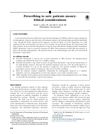August 2019 in “Key engineering materials” A microemulsion with Carthamus tinctorius extract effectively inhibits 5α-reductase and improves skin and hair follicle delivery.
3 citations,
January 2022 in “International Research Journal of Ayurveda & Yoga” Psoralea corylifolia (Bakuchi) is effective for treating various health issues, especially skin disorders.
 2 citations,
March 2018 in “Journal of The American Academy of Dermatology”
2 citations,
March 2018 in “Journal of The American Academy of Dermatology” Doctors should prescribe cheaper, off-label medication and teach patients how to use it to save money ethically.
303 citations,
August 1971 in “The American Journal of Medicine” Melanocytes are destroyed by factors needed for melanin production, causing vitiligo and gray hair.
 April 1982 in “Journal of The American Academy of Dermatology”
April 1982 in “Journal of The American Academy of Dermatology” Retinoids help treat psoriasis effectively, but they can cause side effects and need more research on safe use with other treatments.
31 citations,
February 1982 in “Archives of dermatology” Etretinate was effective for certain skin conditions, but caused side effects like chapped lips, dry mucous membranes, and hair loss.
 December 2022 in “Journal of applied biological chemistry”
December 2022 in “Journal of applied biological chemistry” Betula platyphylla extract, particularly the H3-2 fraction, may help treat hair loss by promoting cell growth and inhibiting a hair loss-related enzyme.
 May 2019 in “The Journal of Sexual Medicine”
May 2019 in “The Journal of Sexual Medicine” Drinking alcohol before taking flibanserin does not increase the risk of severe low blood pressure or fainting.
 July 2019 in “Majalah Obat Tradisional”
July 2019 in “Majalah Obat Tradisional” Green tea leaves extract with flavonoids can promote hair growth.

Fructus Psoraleae may help treat hair loss by inhibiting 5-α reductase and affecting the Nrf2-Keap1 pathway.
 September 2021 in “Fertility and Sterility”
September 2021 in “Fertility and Sterility” Older men have different fertility histories and factors affecting fertility, suggesting they may benefit from earlier fertility evaluations.
 1 citations,
September 2021 in “Fertility and Sterility”
1 citations,
September 2021 in “Fertility and Sterility” American men seeking infertility evaluation are generally older, more obese, have longer infertility duration, and different lifestyle habits compared to Canadian men.
39 citations,
January 1980 in “Dermatology” Cyproterone acetate was effective in treating acne, hirsutism, and alopecia with few side effects.
PRP therapy at Ethos Spa improves hair growth and quality with minimal maintenance.
December 2016 in “Anales del sistema sanitario de Navarra” Frontal fibrosing alopecia is increasing, especially in postmenopausal women, and treatment with finasteride can improve it.
PRP hair treatment is generally safe but may cause minor pain, bleeding, redness, and scalp tightness, and isn't suitable for everyone.
 April 2016 in “Journal of The American Academy of Dermatology”
April 2016 in “Journal of The American Academy of Dermatology” Ixekizumab is effective and safe for patients who did not improve with etanercept treatment for psoriasis.
46 citations,
April 1982 in “Journal of the American Academy of Dermatology” Isotretinoin shrinks sebaceous glands without affecting hair or skin color, unlike etretinate.
 October 2022 in “Journal of Kermanshah University of Medical Sciences”
October 2022 in “Journal of Kermanshah University of Medical Sciences” Different substances can affect how well the skin absorbs minoxidil, a hair loss drug. Caprylic acid helps the skin absorb it the best, followed by propylene glycol and water.
 January 2021 in “International journal of pharmaceutical research”
January 2021 in “International journal of pharmaceutical research” Sansevieria trifasciata P. extracts, especially the ethyl acetate fraction, effectively promote hair growth in male rabbits with hair loss.
September 2021 in “GLOBAL JOURNAL FOR RESEARCH ANALYSIS” The hormonal contraceptive combination effectively reduces androgen excess and improves PCOS symptoms like acne, hair loss, and menstrual issues.
2 citations,
April 2019 in “Pharmaceutical sciences and research” The lotion with menthol promotes more hair growth than the one without menthol.
July 2009 in “Planta Medica” Traditional healers in Pabna, Bangladesh, use various plants to treat different health issues.
1 citations,
October 2019 The 1:5 ratio of fragrant pandan to celery extract best promotes hair growth.
April 2022 in “Jurnal Penelitian Farmasi dan Herbal” Patchouli leaf extract hair tonic at 15% concentration is best for treating hair loss.
20 citations,
May 2007 in “JDDG Journal der Deutschen Dermatologischen Gesellschaft” Etanercept effectively treated a severe skin condition when other treatments failed.
Waru leaf creambath can speed up hair growth in rabbits, especially at 37.5% concentration.
January 2021 in “대한본초학회지(본초분과학회지)” Achyranthis Radix ethanol extract helps hair grow.
 1 citations,
June 2022 in “JAAD case reports”
1 citations,
June 2022 in “JAAD case reports” A woman developed a severe skin reaction after getting a birth control implant.
 June 2024 in “Deleted Journal”
June 2024 in “Deleted Journal” The combined extracts of Moringa and Pandan leaves significantly promote hair growth.












